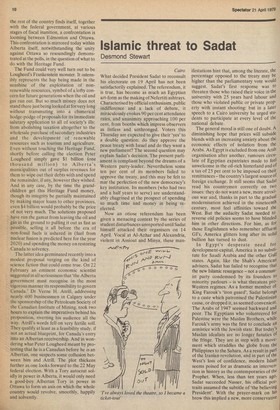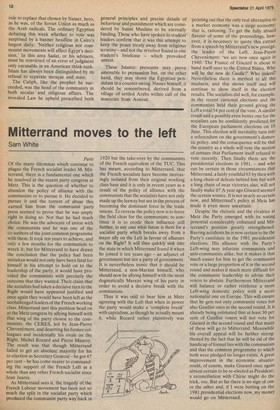Islamic threat to Sadat
Desmond Stewart
Cairo What decided President Sadat to reconsult his electorate on 19 April has not been satisfactorily explained. The referendum, it is true, has become as much an Egyptian art-form as the making of Nefertiti ashtrays. Characterised by official enthusiasm, public indifference and a lack of debate, it miraculously evokes 90 per cent attendance rates, and unanimity approaching 100 per cent, from booths which impress observers as listless and unthronged. Voters this Thursday are expected to give their 'yes' to a double question: do they approve the peace treaty with Israel and do they want a new parliament? The second question may explain Sadat's decision. The present parliament is compliant beyond the dreams of a Western party-leader. Nevertheless some ten per cent of its members failed to approve the treaty, and this may be felt to mar the perfection of the new democracy's key institution. Its members (who had two and a half years to serve) are understandably chagrined at the prospect of spending so much time and money in being reelected.
Now an otiose referendum has been given a menacing context by the series of student disturbances unreported until Sadat himself attacked their organisers on 14 April. Vocal at Al-Azhar and Alexandria, violent in Assiout and Minya, these man ifestations hint that, among the literate, the percentage opposed to the treaty may be higher than the parliamentary vote would suggest. Sadat's first response was to threaten those who raised their voice in the university with 25 years hard labour and those who violated public or private property with instant shooting: but in a later speech to a Cairo university he urged students to participate at every level of the national debate.
The general mood is still one of doubt. A diminishing hope that prices will subside blends with an increasing anxiety about the economic effects of isolation from the Arabs. As Egypt is excluded from one Arab organisation after another, rumours circulate of Egyptian expatriates made to feel unwelcome in the oil-rich hinterland and of a tax of 25 per cent to be imposed on their remittances — the country's largest source of foreign exchange. It still seems that Sadat read his countrymen correctly on two issues: they do not want a new, more atrocious war and, thanks in part to the gradual modernisation achieved in the nineteenth century, most feel affinities toward the West. But the audacity Sadat needed to reverse old policies seems to have blinded him in other directions. For him, as for those Englishmen who remember affluent GI's, America glitters long after its solid bullion has turned to dust.
In Egypt's desperate need for development-capital, America is no substitute for Saudi Arabia and the other Gulf states. Again, like the Shah's American advisers, Sadat has failed to recognise that the new Islamic resurgence — not a communist party condemned by its founders to minority parlours — is what threatens proWestern regimes. As a former member of King Farouk's 'iron guard', Sadat belongs to a caste which patronised the Palestinian cause, or dropped it, as seemed convenient. The Arabs of 1947 seemed backward and poor. The Egyptians who volunteered for Palestine were the Muslim Brothers, while Farouk's army was the first to conclude an armistice with the Jewish state. But today's Muslim idealists are no longer fanatics of the fringe. They are in step with a movement which straddles the globe from the Philippines to the Sahara. As a result in part of the Iranian revolution, and in part of the West's loss of confidence, modern !slant seems poised for as dramatic an intervention in history as the contemporaries of the Prophet. When, less than ten years ago, Sadat succeeded Nasser, his official portraits assumed the subtitle of 'the believing President'. With the prayer-mark on his brow this implied a new, more conservative role to replace that chosen by Nasser, hero, as he was, of the Soviet Union as much as the Arab radicals. The ordinary Egyptian debating this week whether to vote was surprised by a banner headline in Cairo's largest daily: 'Neither religious nor communist movements will affect Egypt's decision.' In this area Sadat, or his advisers, must be convicted of an error of judgment only excusable in an American think-tank. Islam has always been distinguished by its refusal to separate mosque and state.
The Caliph, like the prophet he succeeded, was the head of the community in both secular and religious affairs. The revealed Law he upheld prescribed both general principles and precise details of behaviour and punishment which are considered by Sunni Muslims to be eternally binding. Those who have spoken to student leaders confirm that it was this attempt to keep the peace treaty away from religious scrutiny — and not the revolver found in one student's briefcase — which provoked unrest.
These Islamic pressures may prove amenable to persuasion but, on the other hand, they may shove the Egyptian pendulum in a counter-swing. Nasser himself, it should be remembered, derived from a village of settled Arabs within call of the muezzins from Assiout.







































 Previous page
Previous page